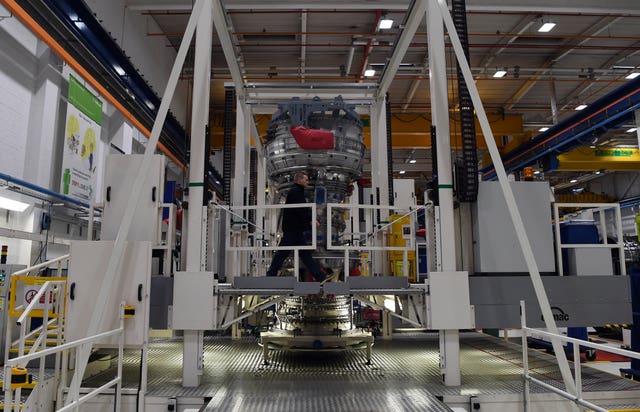
Around 4,600 jobs are being axed at Rolls-Royce in the latest restructuring as the engineering giant looks to slash costs by another £400 million a year.
The group said the bulk of these job cuts would affect the UK workforce and would be made over the next two years, with around a third expected by the end of 2018.
Rolls said the overhaul, which follows its announcement in January that it plans to slash its five operating businesses to three core units, will impact support functions and management, including within engineering.
Chief executive Warren East said: “We have made progress in improving our day-to-day operations and strengthening our leadership, and are now turning to reduce the complexity that often slows us down and leads to duplication of effort.
“It is never an easy decision to reduce our workforce, but we must create a commercial organisation that is as world-leading as our technologies.”
But Rolls insisted it would honour a previous pledge not to impose compulsory redundancies on union-represented staff, including at its sites in Derby, Hucknall and Annesley.

This is the largest reduction in the company’s headcount since 2001, when it announced plans to reduce 5,000 jobs, plus 1,000 contractors, which at the time was around 12% of the workforce.
Overall, Rolls has 55,000 employees worldwide, of whom 26,000 are in the UK, with 15,700 of those in Derby. It employs around 19,400 engineers.
Unite union assistant general secretary Steve Turner said: “This announcement will be deeply unsettling for Rolls-Royce workers and their families and could have a dire economic impact on local communities reliant on Roll-Royce jobs.
“There is a real danger that Rolls-Royce will cut too deep and too fast with these jobs cuts, which could ultimately damage the smooth running of the company and see vital skills and experience lost.”
Rolls said its group-wide revamp will see it shift away from operating with “overlapping activities between individual business units and a large corporate centre”.
It said: “We will be significantly reducing the size of our corporate centre to remove the complexity and duplication.
“A traditionally heavily centralised control culture will be replaced by empowered businesses, in a simpler, leaner structure with much clearer accountabilities.”
The restructuring will cost it around £500 million – including redundancy costs – over the next three years, but will see it save £400 million every year by the end of 2020.
Recent annual figures showed Rolls-Royce returned to profit last year with a pre-tax surplus of £4.9 billion, thanks to a £2.6 billion accounting boost from the recent strengthening of the pound.
But it has been hit by technical issues with its engines, having uncovered durability problems with hundreds of its Package C Trent 1000 engines and earlier this month revealing further issues with a small number of its Package B Trent 1000 engines.
Shadow business secretary Rebecca Long-Bailey said: “This is deeply disturbing news for Derby. Despite making a profit of £4.9 billion last year, this restructuring means over 4,000 people will lose their jobs, which is of major economic significance both locally and nationally.
“There is a real risk that redundancies of this scale will have a detrimental effect not just on the lives of workers and their families but on the future of skills in this much-needed sector and the health of the local economy.
“Today they must provide significant support for employees and discuss with local leaders in Derby what measures they will take to directly support a reinvigorated local industrial strategy.
“It is also imperative that the company honours previous commitments to no compulsory redundancies.”
Ross Murdoch of the GMB union said: “These type of quality, well-paid and skilled jobs will not be easily replaced.
“It will have a devastating impact on workers but also the economy.
“With the Conservative Government’s failure to provide a comprehensive and proactive industrial strategy and their shambolic Brexit negotiations, they are squarely to blame for the high levels of uncertainty in the manufacturing sector.”


Comments: Our rules
We want our comments to be a lively and valuable part of our community - a place where readers can debate and engage with the most important local issues. The ability to comment on our stories is a privilege, not a right, however, and that privilege may be withdrawn if it is abused or misused.
Please report any comments that break our rules.
Read the rules hereLast Updated:
Report this comment Cancel